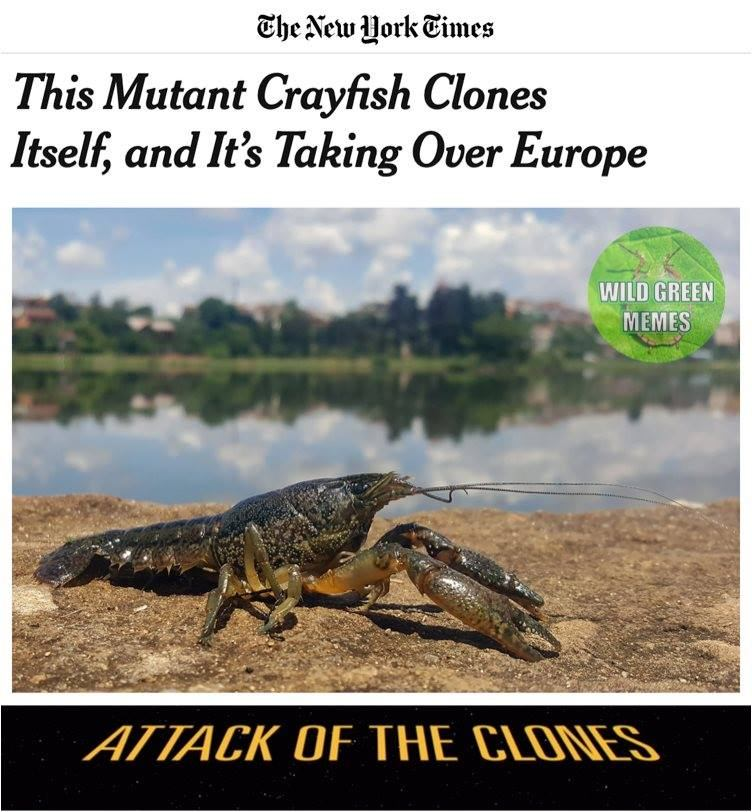the Clone Wars would have been a lot more interesting if the clone troopers just split/budded, would explain all the different patterns and emerging behaviors
Science Memes
Welcome to c/science_memes @ Mander.xyz!
A place for majestic STEMLORD peacocking, as well as memes about the realities of working in a lab.

Rules
- Don't throw mud. Behave like an intellectual and remember the human.
- Keep it rooted (on topic).
- No spam.
- Infographics welcome, get schooled.
This is a science community. We use the Dawkins definition of meme.
Research Committee
Other Mander Communities
Science and Research
Biology and Life Sciences
- !abiogenesis@mander.xyz
- !animal-behavior@mander.xyz
- !anthropology@mander.xyz
- !arachnology@mander.xyz
- !balconygardening@slrpnk.net
- !biodiversity@mander.xyz
- !biology@mander.xyz
- !biophysics@mander.xyz
- !botany@mander.xyz
- !ecology@mander.xyz
- !entomology@mander.xyz
- !fermentation@mander.xyz
- !herpetology@mander.xyz
- !houseplants@mander.xyz
- !medicine@mander.xyz
- !microscopy@mander.xyz
- !mycology@mander.xyz
- !nudibranchs@mander.xyz
- !nutrition@mander.xyz
- !palaeoecology@mander.xyz
- !palaeontology@mander.xyz
- !photosynthesis@mander.xyz
- !plantid@mander.xyz
- !plants@mander.xyz
- !reptiles and amphibians@mander.xyz
Physical Sciences
- !astronomy@mander.xyz
- !chemistry@mander.xyz
- !earthscience@mander.xyz
- !geography@mander.xyz
- !geospatial@mander.xyz
- !nuclear@mander.xyz
- !physics@mander.xyz
- !quantum-computing@mander.xyz
- !spectroscopy@mander.xyz
Humanities and Social Sciences
Practical and Applied Sciences
- !exercise-and sports-science@mander.xyz
- !gardening@mander.xyz
- !self sufficiency@mander.xyz
- !soilscience@slrpnk.net
- !terrariums@mander.xyz
- !timelapse@mander.xyz
Memes
Miscellaneous
Get your stormtroopers the starfish cloning, trooper loses an arm, wait a week and two troopers
Too many crawdads are not a problem as long as you got a pot of boiling water
They're actually quite a big problem. They dig in the sides of canals and dikes causing them to destabilise and collapse
Way too many crawdads are not a problem as long as you boil the entire sea
These are freshwater ones though
Through global warming we will boil the entire world.
Thus solving the problem once and for all
The downside to cloning as a reproductive system is that the entire population will have the same genetics and be vulnerable to the same diseases and poisons.
Aphids don't care.
Aphids do sexual reproduction in autumn. It's just spring/summer they clone.
How can I subscribe to aphids trivia?
I wish I didn't know.
As far as I can tell 1 week to hatch and 1 week to reach maturity seems like a good rule of thumb. Different species have different temperature optimums but I can't see how that is practically relevant to anyone.
I wish I didn't know.
It could be worse. You could know that bedbugs reproduce through a process called "tramatic insemination"
I knew that.
They also thrive on incest, and love to breed with their own parents and siblings.
Bedbugs are already just super gross, but the more you learn about their biology the more gross they become.
Would I consider that on par with how the Tarantula Hawk Wasp reproduces?
For those not in the know:
Consider yourself warned.
Tarantula Hawk Wasp mothers find themselves a tarantula - yep, a Hugh Jazz spider - and inject venom into the spider, instantly paralysing it. They then drag the paralysed but fully conscious spider to an underground hole, where they lay an egg on the spider. Her mission complete, momma flies off to do fuck knows what, leaving the paralysed spider behind with ~~a ticking time bomb~~ her egg.
A few days later, that egg hatches, and the larva, seeing a perfectly tasty meal nearby, digs into the spider, eating it from the inside out, purposely avoiding vital organs to keep them alive as long as possible - while, again, the spider is fully aware what's going on and completely powerless to do anything.
Yes, they're native to Australia. Why'd you ask?
They're also native to a few other places, Europe one of the few places they're not native.
Wouldn't there still be random mutations caused by epigenetics over time?
Sure, but the population would be so similar that it probably wouldn't make much difference.
if the environment is stable , then parthonogenesis would be common. as for deleterious effects, you mostly see that inbreeding more than parthenogenesis, since if your cloning, epigenitc markers usually remain the same.
the only thing is they wont able to adapt to sudden changes in environment or another invasive species outcompetes them.
He make a good snak
Marbled crayfish are pretty cool. A new species that evolved in captivity
Oh, these things are wild! A new species that clones itself rapidly, can carry a crayfish-killing plague, and is relatively rapidly colonizing the planet (freshwater only).
This feels like a thing spiders do. They can produce several clutches of eggs after mating once. If, without a mate, they could just.. do that, "even a single wolf spider egg can contaminate an entire planet."
Its a good year for crayfish sci-fi horror
people often forget invasive species often bring diseases with them, that they are adapted to but in a new environment with others species that have no natural immunity, it would wipe native populations faster than the actual animal itself.
he go clack, clack, clack?
I hope he's at least tasty
invasive plants do this all the time, they are hard to eradicate once they become establish.
